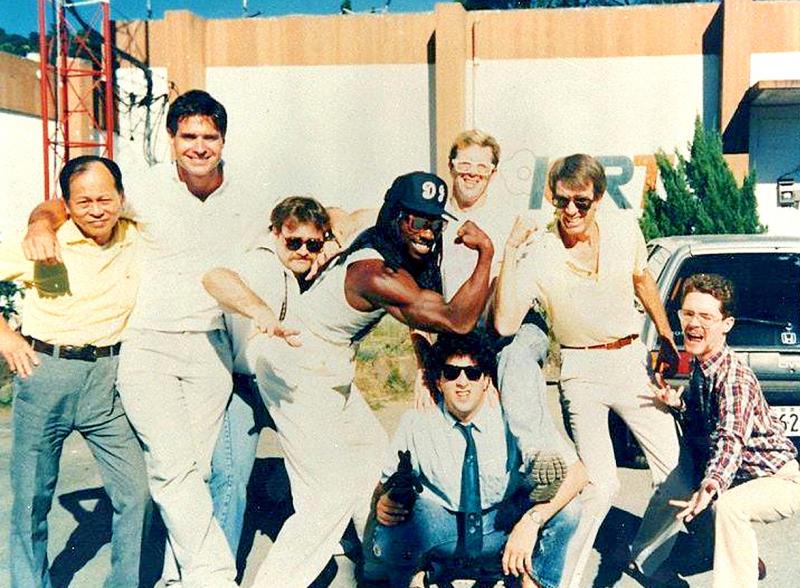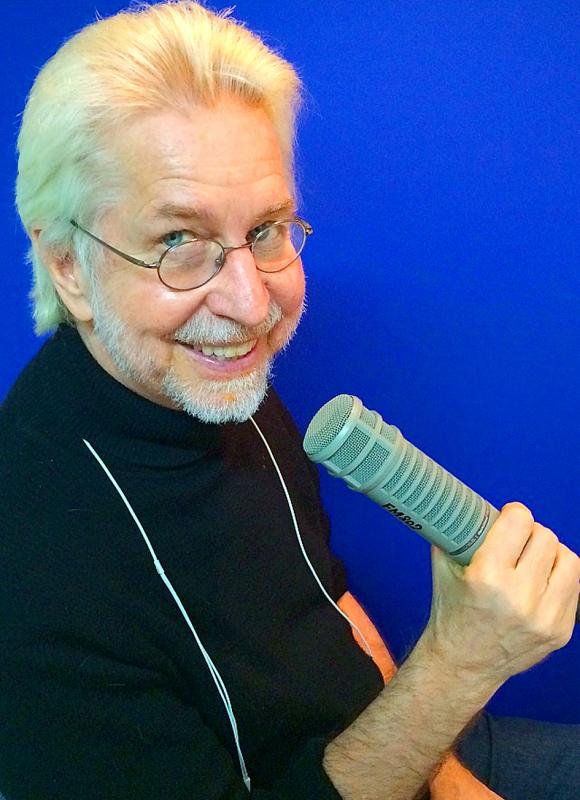After the deaths of several beloved International Community Radio Taipei (ICRT) personalities over the past several years, former DJ Rick Monday wanted to do something to preserve in time the station’s golden days when “radio was king.”
“We couldn’t let any more people go without [recording their memories],” Monday says. “But we didn’t just want to sit there and talk about them. We wanted their voices. So we started reaching out to former employees, and we got 17.”
Most importantly, Monday got in touch with former general manager Craig Quick, who took over the station in 1983 and is now in his 80s.

Photo courtesy of Radioactive Taiwan
“It was his vision,” Monday says. “None of us came here and said we were going to make Taiwan a better place; we all stepped into Craig’s vision.”
These testimonials, along with recollections from 10 former listeners, eventually morphed into Radioactive Taiwan, a five-episode podcast discussing the groundbreaking English-language station’s impact on Taiwanese society during the 1980s and 1990s. The show is narrated by iconic former DJ Bobby Kong, who now lives in Tokyo, and produced by former host Gray Gleason out of Manila.
“ICRT was social media,” Kong tells the Taipei Times. “People who spoke English listened to ICRT to get the latest music and gossip, and for Chinese listeners it was a place where they could hear native English speakers outside of the buxibans. They could call in, talk to DJs and make requests in a new, unique American style that was different from what was being broadcast in Taiwan.”

Photo courtesy of Rick Monday
The retro-sounding series covers much ground, from the station serving as a gateway to Western culture, to reporting on sensitive news topics during martial law, to its role as an active community partner. Among other items, ICRT organized one of Taiwan’s earliest singing contests, helped Coca Cola break into the local market through musical activities and reportedly pulled off one of the largest Fourth of July bashes in Asia at that time.
“We were by far a lot more than just a radio station,” Monday says. “That’s why it’s called Radioactive.”
To set a solid deadline, the team aimed to complete the project in time for The People’s Choice Podcast Awards, which is accepting votes until the end of the month.

Photo courtesy of Bobby Kong
COLLECTING MEMORIES
Monday launched the project about a year ago, starting by contacting former co-workers with the help of former news reporter and marketing manager Nicholas Gould.
“We tried to remember what department those people were in,” he says. “ICRT had over 150 employees then.”
It wasn’t easy to get them to talk at first: “A lot of people said, ‘Rick, you still live in Taiwan, you still listen to ICRT and it’s easy for you to remember. Think about me, I left and started another career … I’m a father and grandfather now.’”
They were more receptive when asked for memories working for Quick, who upgraded and expanded ICRT from a small community station into a state of the art, full-blown American-style operation. He also helped combat pirating in Taiwan by licensing Western pop hits and shows such as American Top 40.
“People were like, ‘I still know in my heart why I worked for Craig,’” Monday says. “He just came in and got everything established. I worked in radio in the US and when I came here and heard about what he wanted to do, I said, ‘hell yeah.’”
Kong was reluctant to narrate the show at first since he had been away from ICRT for so long, but Monday insisted that “everyone knew his voice.” He worked closely on the script with Monday and Gleason.
“This is a tribute to Gray’s sound engineering and Bobby’s narration,” Monday says. “I was just kind of the secretary.”
Things moved slowly for about a year, but Monday says he decided to ramp things up after former host and Taipei Times deputy chief copy editor Diane Baker died in January. She had agreed to record her bit for the podcast just four days before her death.
“We had to finish it and get it out for people to listen to,” he says. “I said, I’m going to push the last of y’all who said you were going to do it but haven’t. Damn it, just do it, because none of us know how much time we have left on earth.”
HIT EVENTS
Although ICRT stood out in those Martial Law-era days for its relatively unrestricted newscast — it was the first to host a Democratic Progressive Party politician — Monday says he had a hard time getting news staff on the podcast. As a result, the podcast focuses more on the station as a voice of American soft power and how it was immensely popular among students who wanted something different in a society that was opening up after decades of authoritarian rule and censorship.
Monday says his top four off-air events were promoting the 1987 Cutting Crew show and the 1990 BB King and Ray Charles concert (where they had to instruct the audience to applaud after each song), the wildly successful 1989 American Chamber of Commerce Fourth of July bash and the Young Stars university singing contest.
Members of Cutting Crew and the immensely popular Air Supply share their memories of playing in Taipei on the podcast.
Kong says he adopted the singing contest from a popular venture he did with high school students in Hawaii, and it became quite successful with big-name sponsors, record deals and scholarships. The scale was unprecedented as they held preliminaries in over 100 universities, giving a chance to a much wider range of hopefuls.
One of Kong’s fondest memories of interacting with the audience was the “Xiaofan Yelling Contest,” where people called in and gave their best rendition of street vendors hawking their wares for prizes.
“I sent the podcasts to my brother, and he said, ‘I knew you were in Taiwan to do radio, but I had no idea you were doing so many interesting things,” Kong says.
With traditional media in decline due to the Internet, the show provides fascinating insight to what a radio station could do back then. “We want to give a shout out to [current general manager] Tim Berge for keeping ICRT alive; it’s tough,” Monday says.

Mongolian influencer Anudari Daarya looks effortlessly glamorous and carefree in her social media posts — but the classically trained pianist’s road to acceptance as a transgender artist has been anything but easy. She is one of a growing number of Mongolian LGBTQ youth challenging stereotypes and fighting for acceptance through media representation in the socially conservative country. LGBTQ Mongolians often hide their identities from their employers and colleagues for fear of discrimination, with a survey by the non-profit LGBT Centre Mongolia showing that only 20 percent of people felt comfortable coming out at work. Daarya, 25, said she has faced discrimination since she

April 21 to April 27 Hsieh Er’s (謝娥) political fortunes were rising fast after she got out of jail and joined the Chinese Nationalist Party (KMT) in December 1945. Not only did she hold key positions in various committees, she was elected the only woman on the Taipei City Council and headed to Nanjing in 1946 as the sole Taiwanese female representative to the National Constituent Assembly. With the support of first lady Soong May-ling (宋美齡), she started the Taipei Women’s Association and Taiwan Provincial Women’s Association, where she

It is one of the more remarkable facts of Taiwan history that it was never occupied or claimed by any of the numerous kingdoms of southern China — Han or otherwise — that lay just across the water from it. None of their brilliant ministers ever discovered that Taiwan was a “core interest” of the state whose annexation was “inevitable.” As Paul Kua notes in an excellent monograph laying out how the Portuguese gave Taiwan the name “Formosa,” the first Europeans to express an interest in occupying Taiwan were the Spanish. Tonio Andrade in his seminal work, How Taiwan Became Chinese,

More than 75 years after the publication of Nineteen Eighty-Four, the Orwellian phrase “Big Brother is watching you” has become so familiar to most of the Taiwanese public that even those who haven’t read the novel recognize it. That phrase has now been given a new look by amateur translator Tsiu Ing-sing (周盈成), who recently completed the first full Taiwanese translation of George Orwell’s dystopian classic. Tsiu — who completed the nearly 160,000-word project in his spare time over four years — said his goal was to “prove it possible” that foreign literature could be rendered in Taiwanese. The translation is part of